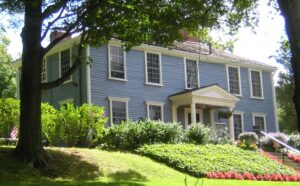On 6 July 1774, sixty men from towns in Berkshire County met in Stockbridge as a county convention.
On the colony’s western end, that gathering was far from the royal governor’s troops, and also beyond the powerful Loyalists of the Connecticut River valley.
I don’t think those men had been elected by their towns, so this might have been a self-appointed group of activists. They endorsed the Solemn League and Covenant boycott, and they provided a model for a new form of resistance.
County conventions thus became another way to protest Parliament’s Coercive Acts. Like court closings, they moved from west to east, moving closer to Boston and the redcoats.
The Massachusetts Government Act arrived during that time, putting new restrictions on town meetings. But that law said nothing about county meetings because there hadn’t been any before.
On 16 August 1774, men from “Every Town & District in the County of Suffolk, Except Weymouth, Cohasset, Needham & Chelsea” met at Thomas Doty’s tavern in Stoughton. (That part of town later became Canton.) At that time Suffolk County included not only Boston but also all of modern Norfolk County extending to the Rhode Island border.
However, those men decided not to proceed formally “as Several Towns Had not Appointed Delegates for the Special Purpose of a County Meeting.” Instead, they issued a call for all towns to send such delegates to a meeting “at the House of Mr. Woodward Innholder in Dedham on Tuesday the Sixth day of September.”
The owner and likely manager of that inn was actually Richard Woodward’s wife, formerly Mrs. Deborah Ames. She had run the place as a widow from 1764 to 1772, and would run it again after she and Woodward divorced in 1784.
On 6 September, the Suffolk County delegates convened and named a large committee headed by Dr. Joseph Warren, one of the several Boston delegates, to write its resolutions. Warren was a practiced newspaper essayist, and he could also build on the resolutions adopted by Berkshire, Worcester, and Middlesex Counties.
On 9 September, the Suffolk County Convention met in Milton “at the house of Mr. Daniel Vose”—another tavern. The delegates unanimously approved the resolutions Dr. Warren had drafted.
Warren then had Paul Revere carry Suffolk County Resolutions to Samuel Adams and his other colleagues in Philadelphia. There the Continental Congress had been startled by the “Powder Alarm” scare, and its members no doubt welcomed Revere’s confirmation that Boston wasn’t in ashes and was still resisting. They endorsed the resolutions, elevating that document above the other Massachusetts county declarations.
Of the three taverns associated with the Suffolk County Convention, only the Vose house survives, albeit in a different place. It’s now headquarters of the Milton Historical Society and is called the Suffolk Resolves House.
On Sunday, 31 August, the Milton Historical Society, the Massachusetts Freemasons, and the Dr. Joseph Warren Foundation will commemorate the 250th anniversary of the Suffolk Resolves with guided tours of the Vose house, speakers, and reenactors. This event is scheduled to run from 9:00 A.M. to 4:00 P.M. Tickets are $10 per adult, $20 for a family of two adults and children under eighteen. Proceeds will benefit the Milton Historical Society.

No comments:
Post a Comment